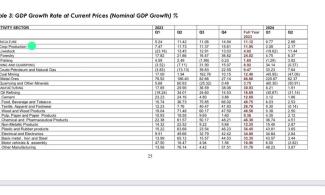
Although the data shows that the contribution to the Agricultural sector GDP’s contribution to national GDP in the second quarter increased to 2.17, from the 2.08% recorded in Q1, it is still a poor dip going by the figures posted in the 2023 fiscal year.
Details released by the National Bureau of Statistics (NBS) have shown that the crop production sector performed woefully in terms of contribution to the Gross Domestic Product of the country in 2024.
Although the data shows that the contribution to the Agricultural sector GDP’s contribution to national GDP in the second quarter increased to 2.17, from the 2.08% recorded in Q1, it is still a poor dip going by the figures posted in the 2023 fiscal year.
In the first quarter of 2023, crop production contributed 7.47%, 11:73% in second quarter , 11.37% in third quarter and 15.61% in fourth quarter.
Data showing the drastic fall in crop production may explain in part the challenge of food inflation faced by the country even for locally produced food items.
Currently, Nigeria’s food inflation stands at 39%, with Nigerians lamenting inability to buy food items and the increasing cost of living.
SaharaReporters reports that the Minister of State for Agriculture had noted that Nigeria would start seeing gains of crops planted in three months from July, stating that food scarcity may persist till then.
He had said, “You will see a lot of programmes trying to dampen the situation.
“Agriculture has a time frame. Now, a lot of production is ongoing. We are in the rainy season and if you look at the fields, there is a lot of cropping going on. Those croppings are not food.
“They will only translate to food after three months. So, until then, this story you are talking about will continue.”
The minister added that the country, in the past, relied more on rainy-season farming and needed to take the dry season more seriously.
“We realised over the past few years that we have not been taking our dry season agriculture seriously,” he added.